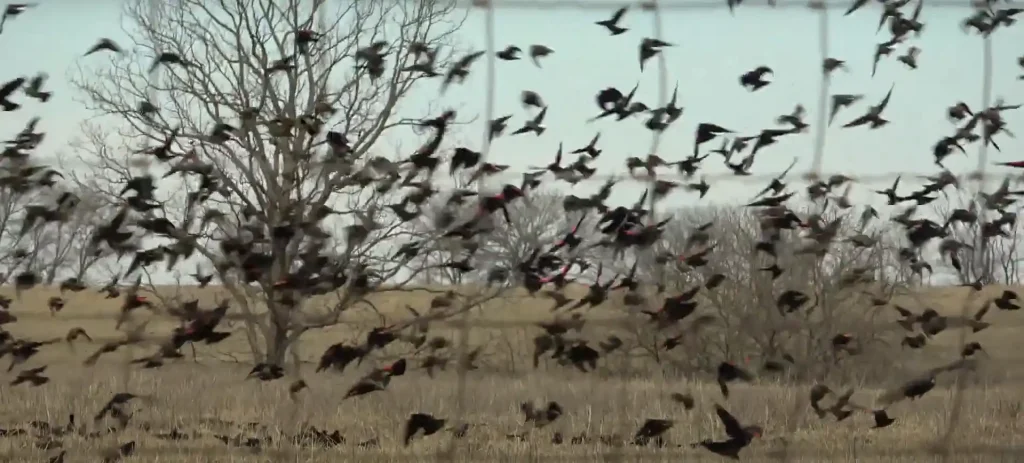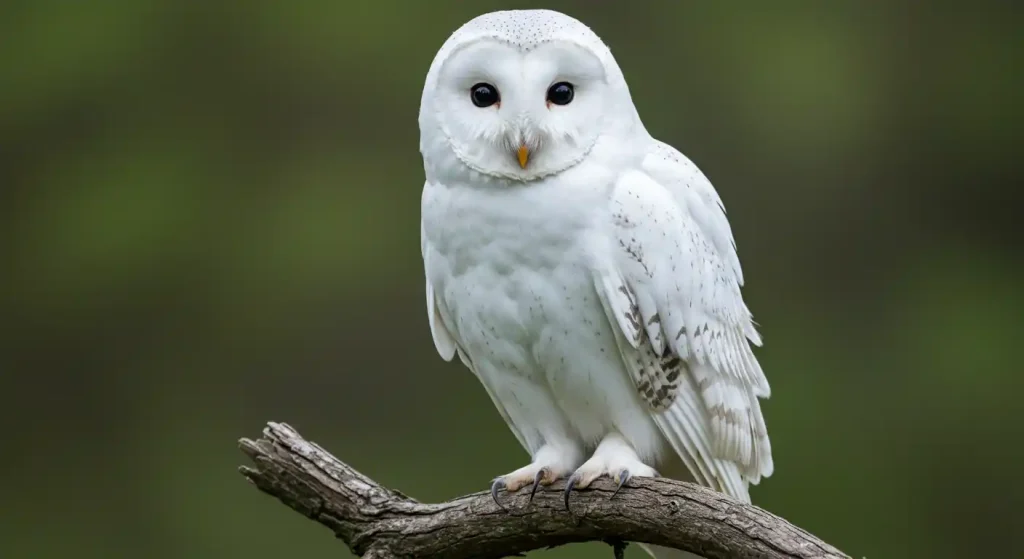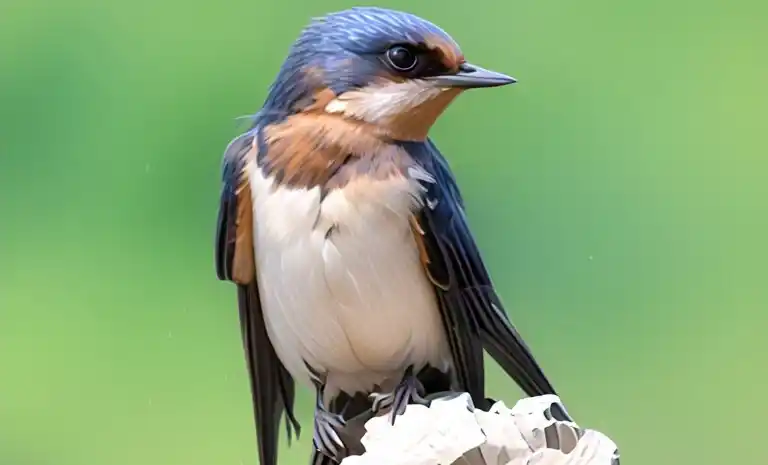The turkey vulture is known for its powerful olfactory system, the best in the bird kingdom. This bird can smell carrion from miles away, which translates into a gift for discernment and the ability to judge well.
Seeing a turkey vulture is a sign to sniff out the truth and use your best judgment in making decisions. This magnificent bird is often associated with transformation, purification, and rebirth, carrying profound messages from the spiritual realm.
Though often misunderstood as ugly scavenging creatures, vultures have a fascinating history in cultures and mythology across the globe. They are symbols of power, change, freedom, and wisdom. Their soaring abilities and unique behaviors make them a powerful symbol in the spiritual world.
When you see a turkey vulture, it reminds you to use discernment and judgment in your life. These interesting birds invite you to look deeper into your own life, embracing change and understanding the spiritual messages they carry.
Table of Contents
ToggleTurkey Vulture Spiritual Meaning – The Brief Answer
Turkey vultures symbolize death and rebirth, highlighting the cycle of life. Spiritually, they represent transformation, where one must release old habits to embrace new beginnings.
These birds are also linked to purification and cleansing, as they play a vital role in cleaning the environment by consuming decaying matter. Their presence can signify patience and respect for life’s natural cycles, urging us to trust the timing of the universe.
Additionally, turkey vultures are connected to psychic abilities and intuition, reminding us to trust our instincts and discern truth in difficult situations. They symbolize a powerful journey of personal growth, encouraging us to rise above challenges and embrace change.
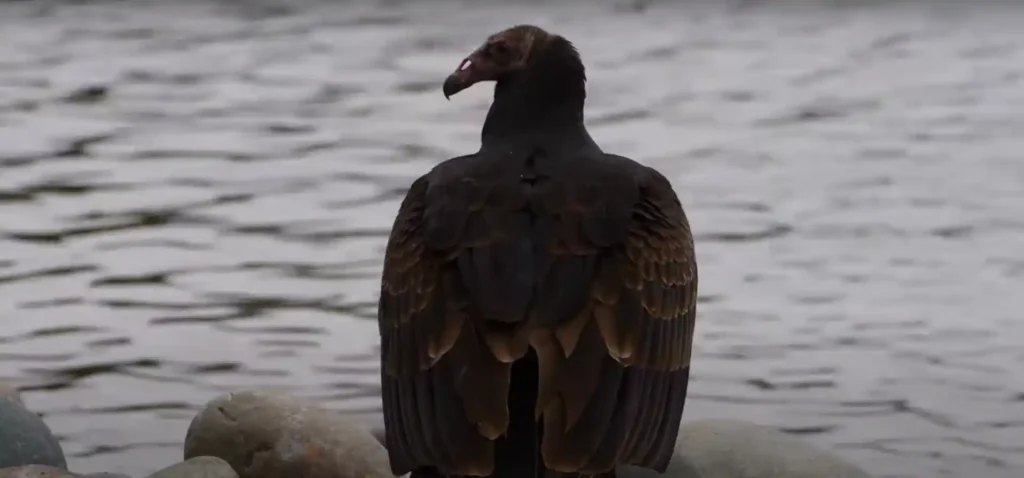
What do vultures mean spiritually?
Death and Rebirth
Vultures feed on carrion, the decaying flesh of dead animals, which often leads people to associate them with death. In the spiritual realm, however, death is closely tied to rebirth.
Seeing a vulture might seem like a negative sign, but it often symbolizes a transformation or a chance to discover your authentic self and achieve your full potential.
Purification and Cleansing
Vultures are considered dirty creatures because of their scavenging behavior, but they play an important role in cleaning the ecosystem. By eating the flesh of dead animals, they help in preventing the spread of disease.
This vital role links them to purification and cleansing, earning them the nickname “nature’s clean-up crew.”
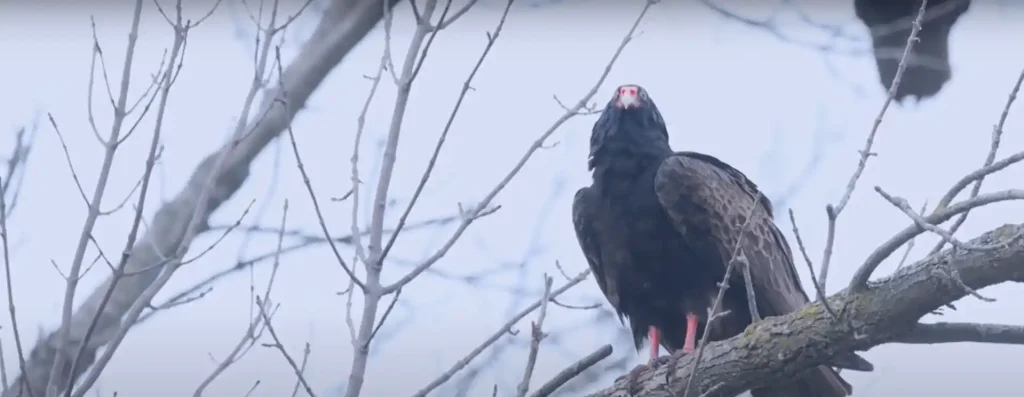
Patience and Respect
Vultures are patient creatures. When they spot a dead animal, they don’t automatically swoop in to feed. Instead, they wait for eagles to attack the carcass first, making it easier for them to eat.
This behavior reminds us to respect the cycle of life and to trust that the universe has its timing. Good things take time, and staying focused on our goals is key to achieving them.
Protection and Family
Black vultures roost together in family units and continue to feed their young for up to 8 months after they’ve fledged. Seeing a black vulture might be a sign that you are protected by a higher power, such as God, and that you have the skills and resources to overcome adversity.
It may also be a reminder to set boundaries and protect your well-being.
New Beginnings
Due to their ability to soar high into the skies, vultures are seen as messengers between the spiritual and material worlds. They symbolize the need to move forward, to let go of things that no longer serve you, and to embrace new opportunities.
Seeing a vulture can be a gentle reminder to embrace change and seize the potential that lies ahead.
What does a turkey vulture mean spiritually?

Discernment and Judgment
Spiritually, turkey vultures hold deep significance. They represent discernment, a gift that comes from the best olfactory system in the entire bird kingdom.
Their ability to smell carrion from miles away translates into a powerful sense of smell, symbolizing the ability to sniff out the truth and use the best judgment to make decisions. Seeing a vulture is often seen as a sign to trust your instincts and judge well in difficult situations.
Purification and Transformation
A turkey vulture also carries the spiritual meanings of purification and transformation. As it consumes decomposing matter, it teaches us to embrace the process of releasing what no longer serves us and letting go of old habits.
This bird encourages us to face our fears, shed old habits, and transform into a higher version of ourselves. Through this, we can purify our minds, bodies, and souls, leading to personal growth and spiritual rejuvenation.
Rebirth and Renewal
The rebirth and renewal symbolized by the turkey vulture remind us of the freedom to rise above challenging circumstances. Its ability to soar high in the sky represents the power to reinvent ourselves, start fresh, and embrace new beginnings.
This bird motivates us to embrace change, evolve, and seize the infinite possibilities that life offers, even when things seem difficult.
Psychic Abilities and Intuition
Additionally, the turkey vulture is a symbol of psychic abilities and heightened intuition. With its keen sense of smell, it can locate decaying flesh from great distances, showing us the importance of perceiving energies that aren’t easily visible.
It encourages us to trust our intuition and develop our psychic gifts. By paying attention to subtle signs, we can navigate our spiritual journey with more awareness and wisdom.
What Does a Vulture Symbolize?

Symbols of Renewal and Strength
Vultures are fascinating birds that symbolize many things, including renewal, strength, and the cycle of life and death. They are often seen representing transformation and change, making them powerful symbols in many cultures.
Vultures guide us to trust our intuition and embrace life’s transitions with wisdom. In different cultures, these birds have varied views, ranging from omens of bad luck to symbols of protection, cleansing, and good fortune.
Vital Role in Nature
Despite their scavenging habits, which can evoke a response of revulsion in humans, vultures play a vital role in nature. By consuming carcasses, they help to reduce the spread of disease and clean up the environment, acting as natural scavengers and sanitizers.
This essential function ties them to themes of survival and death. As an animal totem, the vulture serves as a spiritual guide, symbolizing empowerment and the ability to accomplish tasks.
Symbols of Power and Change
In some cultures, vultures are also associated with power and strength. They can symbolize change or metamorphosis, with their swooping wings representing the majestic beauty of flight and freedom.
By cleaning up dead carcasses, they purify the environment from harmful bacteria, making them one of nature’s most perfect cleansing animals.
Spiritual Guidance and Prophecy
Vultures are believed to have prophetic powers, able to predict the future and guide us on our paths. They are seen as a powerful symbol of wisdom, and their presence can be a sign that we should trust our intuition.
Their spiritual significance includes guiding spiritual journeys, offering insights, and representing rebirth and personal growth. In times of transition, vultures may appear in the wake of tragedy, helping to clean up the mess left behind and signaling the start of something new.
What Does It Mean When You See a Vulture Flying?

When you see a vulture, it often means that something dead or dying is nearby. Vultures are scavengers that feed on carrion—the decaying flesh of dead animals—and they often congregate in areas where they can find food.
In many spiritual traditions, vultures represent the cycle of life and death. They are seen as messengers from God, reminding us that death is a natural part of life and that we should be grateful for our precious existence on this planet.
This perspective aligns with the spiritual path, guiding individuals to release attachments and embrace change for spiritual renewal. Vultures can also symbolize transformation and renewal; when one creature dies, another is born.
Seeing a vulture can be interpreted as an invitation to create space for something new and better, as the turkey vulture reminds us of profound insights and guidance for our spiritual journeys.
Different Types and Colors and Turkey Vulture Symbolism

Black Vulture Symbolism
Black vultures are often symbolized as bad luck and are considered an omen of death. They are associated with powers of destruction, feelings of isolation, and a sense of foreboding. These birds are linked to negative powers in our lives and are seen as a sign of coming danger.
Turkey Vulture Symbolism
In contrast, Turkey Vultures, also known as turkey buzzards, symbolize good luck. They are associated with transformation and growth, serving as a sign of guidance in challenging times.
As scavengers, they remind us to take advantage of the resources found in every situation. The Turkey Vulture is also associated with purification and is seen as a sign of hope in difficult times.
Bearded Vulture Symbolism
The Bearded Vulture is another type that symbolizes strength and courage. It represents the ability to overcome obstacles and rise above the difficulties in life. This vulture serves as a reminder to stay strong and fight for what is important.
Vulture Eye Symbolism
The Vulture eye, as depicted in Edgar Allan Poe’s “The Tell-Tale Heart,” symbolizes the narrator’s inner darkness. The eye repulses him so much that he feels compelled to kill the old man in desperation, trying to rid himself of this symbol of his dark nature.
Symbolically, the vulture’s eye represents not only his inner demons but also those of humanity, suggesting that we all have the capacity for darkness. It serves as a reminder to stay vigilant in our fight against our dark impulses and encourages readers to look inside themselves and discover their inner struggles.
Vulture Feather Symbolism
Vulture feathers are a symbol of protection, strength, and courage. In some cultures, they are believed to ward off evil and bring good luck to the wearer. Vulture feathers also represent wisdom, insight, and the power to transcend boundaries and connect with the divine.
They remind us that death is an important part of life and that we should be grateful for the time we have.
What do vultures mean in the Bible?

Symbol of Death and Judgment
Biblically, vultures are powerful symbols. They often symbolize death, judgment, and God’s wrath in the Bible. Vultures are associated with doom and impending judgment, as seen when a flock of vultures is circling a carcass.
This image represents the fall of righteousness and the gathering of the wicked. Seeing this creature could be a sign to reflect on your spiritual journey and seek forgiveness.
Biblical References to Vultures
In Proverbs, the scripture states that the “eye that mocks a father and scorns to obey a mother will be picked out by ravens of the valley and eaten by vultures.” Here, vultures represent the fallen world and a dishonorable death.
The Bible shows vultures as symbols of God’s judgment and faithfulness. In the Old Testament, God uses vultures to fulfill punishment against those who have sinned or refused to obey.
Vultures as Symbols of Protection
In the Christian faith, the presence of vultures can also be seen as a sign of protection and provision from God. The Bible portrays vultures as wise watchers, known for their patience as they wait for days for carcasses to appear so they can feed.
This connection shows their link to survival, perseverance, and enduring through times of struggle and suffering. During moments of temptation, we are reminded to make wise decisions despite difficult circumstances.
Vultures in Different Cultures & Mythologies
Ancient Egyptian Beliefs
Ancient Egyptians believed that vultures were strongly associated with maternity, compassion, and protection. The vulture was often linked to Mut, the sky goddess and divine mother, who wore a vulture headdress as a symbol of these positive traits.
In the New Kingdom, queens also wore this headdress to symbolize their roles as protectors.
Native American Views

In Native American cultures, vultures are seen as symbols of death and suffering. Most tribes view them as a negative omen and a sign of danger. They are often considered aggressive troublemakers who lie, cheat, and hoard community resources, even bullying other birds.
Tibetan Buddhist Practices
For Tibetan Buddhists, vultures have a different role. They rely on these birds to dispose of the bodies of monks. The body is left exposed to the elements in a cemetery, tied to a stake, and undressed.
Corpse-cutters then throw pieces of flesh to the vultures or pound and mix the bones into feed. This practice is rooted in the belief that there is no need to fear death and that human bones and skin can be used in rituals to dispel fear.
Zoroastrian Rituals
In Zoroastrian tradition, vultures are used to dispose of the dead. The practice involves feeding the corpse to vultures rather than burying or cremating it, which is seen as polluting.
In India, this is done in a dokhma, a circular stone tower that is open to the sky, allowing proper drainage of body fluids.
Greek and Roman Myths
Greek and Roman myths also give vultures a significant role. In Greek mythology, vulture feathers were believed to have obstetric value, used by women to ease childbirth.
In Roman mythology, vultures were considered a talisman for happiness and were one of the symbols of the founding of Rome.
African Cultural Symbolism
In African cultures, vultures are a symbol of power, protection, and strength. They are often seen in mythology as beings with divine intelligence, able to use their keen vision to see through obstacles and discover hidden truths.
They are also linked to death and are believed to carry the souls of the dead to the afterlife. In traditional African cultures, vultures are seen as a protective force, guarding against evil spirits.
Egyptian Mythology
Egyptian mythology also holds vultures in high regard, associating them with protection and death. The ancient Egyptians saw vultures as protectors of the dead believed to carry their souls to the afterlife.
Vultures were also a part of royal regalia, appearing alongside the cobra on the forehead of a Pharaoh to symbolize protection. Nekhbet, one of the patron goddesses of Egypt, was often depicted as a vulture, symbolizing strength and resilience.
Mesopotamian Mythology
In Mesopotamian mythology, vultures are seen as symbols of power and victory. They were associated with divine justice and were seen as messengers of the gods, delivering judgment to those who had wronged others.
Vultures were also viewed as protectors of the deceased and guardians of the afterlife, as depicted in various Mesopotamian artifacts like seals and cylinder stamps.
Assyrian Beliefs
The Assyrians also had a strong belief in the vulture’s role. In their mythology, the vulture was seen as a powerful angel of death, connecting day and night. It was believed to have the ability to bring life and take away souls, symbolizing the importance of the cycle of life.
Greek Mythology
In Greek mythology, vultures are seen as symbols of decay and were believed to be instruments of divine punishment sent by Zeus. In ancient Greek culture, they represented ruin and destruction, often depicted in folklore, myths, and symbolism.
Roman Mythology
In Roman mythology, vultures were revered as sacred creatures due to their ability to locate and consume the dead. Vulture symbolism was deeply embedded in Roman culture, with many gods associated with their characteristics.
They were seen as messengers bringing knowledge, and their presence was believed to bring a sense of order and clarity.
Celtic Mythology
In Celtic mythology, vultures have a deep spiritual meaning and are often associated with life-changing events. They are seen as a sign of transformation, death, and rebirth, and are believed to bring endurance and strength to those experiencing major transitions in life.
Native American Symbolism
In Native American cultures, vultures hold complicated symbolism. While some tribes see them as symbols of death and decay, others view them as omens of danger or strife.
Some tribes even believe that vultures can bring good fortune or bad fortune, depending on their behavior. They are also seen as messengers of the gods, bringers of wisdom, and protectors who can guide a person on their spiritual journey.
Mayan Beliefs
In Mayan cultures, vultures symbolize transformation and renewal. They were believed to take death and transform it into life through their power of cleansing.
The King Vulture was especially associated with Mayan funeral traditions and was considered a celestial being that brought peace and solace to the deceased.
Aztec Symbolism
The Aztecs also saw vultures as important symbols. Cozcacuauhtli, which translates to “vulture,” is a day associated with spiritual wisdom and clarity in Aztec mythology.
The vulture symbolizes the goddess Itzpapalotl’s ability to purify and rejuvenate and is seen as a bird of strength and resilience.
Tibetan Cultural Views
In Tibetan culture, vultures are considered sacred birds. They are believed to possess the power of healing and cleansing and symbolize wisdom, strength, and protection.
In Tibet, vultures are seen as a sign of luck, good fortune, and positive energy. They are also said to live longer than any other bird species, representing longevity in Tibetan beliefs.
Chinese Mythology
In Chinese mythology, vultures are seen as symbols of good fortune and prosperity. They are believed to bring long life, wisdom, strength, courage, and power. Seeing a vulture is considered a sign of good luck for the person who encounters it.
Hindu Symbolism
In Hinduism, vultures are seen as symbols of transformation and energy. They are believed to have the power to turn death into new life as they scavenge through carcasses.
The vulture is also seen as a messenger of the gods, carrying messages between the mortal world and the divine. In some Hindu cultures, vultures are revered as deities, with offerings made to them during certain festivals.
Buddhist Mythology
In Buddhist mythology, the vulture is said to embody the Dharmapala, or guardian of Dharma. This idea originated in India and is still prevalent in Tibetan Buddhism, where vultures are seen as protectors of sacred sites and temples.
They are believed to have the power to ward off evil, making them powerful symbols in Buddhist beliefs.
What do vultures symbolize in dreams?

Dreaming of a vulture often represents a significant change and the release of old patterns. These vulture dreams can help you understand your hidden thoughts and emotions in waking life.
They often symbolize the parts of yourself that you wish to change. The dream meanings can depend on the details of your specific dream scenario, but generally, dreaming of a vulture asks you to reflect on the past and make positive changes.
If you dream of a vulture flying, it could be a sign of good luck and prosperity. A dream of a flock of vultures might mean that a loved one will receive a lot of money. On the other hand, a dream of a vulture attacking could be a sign that someone you love may betray you.
If you dream of a vulture eating your enemy, it signifies that you can overcome any obstacle that heads your way. But if you dream of a vulture eating you alive, it might mean that you are feeling overwhelmed by change and need to let go of negativity.
These vulture dreams often symbolize a transformation and new beginnings, encouraging you to act as a watchful observer of your life. They may warn you of possible neglected opportunities or signal a period of renewal.
It is important to pay attention to the context in which the vulture appears in your dream. For instance, if the vulture appears with food in its talons, it could mean that you are being asked to nourish your physical body and soul.
Are vultures good or bad omens?
Generally, vultures are considered good omen despite their association with death. While it may be easy to assume they are bad omens, vultures are adaptable and resourceful creatures.
They can soar great distances without expending much energy, and their bald heads help prevent rotting flesh from soiling their feathers. By adopting the vulture’s positive traits, you can easily overcome obstacles.
What Do Vultures Symbolize in Arts and Literature?

In modern times, vultures often appear as symbols of death and what’s to come, especially in gothic literature and old Westerns. These birds are often depicted as black omens, looming over dusty roadsides or perching ominously in scenes filled with sinister portents.
Their presence usually hints at bad news or ill luck for the characters involved. The darker symbolism of vultures isn’t just limited to these tales but extends to various forms of art and literature.
They embody a stark reminder of our own mortality and the humble place we hold in a greater universe.
The meaning of vultures can depend greatly on the context in which they are depicted. While they often symbolize scavenging or opportunistic behavior, like the concept of the “vulture capitalist,” they can also represent hope and rebirth.
This duality shows that vulture symbolism is versatile and reflects the tone of the work they appear in. The collective imagination often grapples with the context and tone in which vultures are presented, balancing their role as ominous figures with their part in the cycle of life and renewal.
Their image reminds us of the inevitable, yet it also hints at the possibility of new beginnings after darkness.
Vulture Spirit Animal
The vulture spirit animal holds significant power in its ability to help us look deep into our souls. This creature often appears in our lives when we need to lose our carnal attachments and look deeper into the spiritual aspects of our existence.
It asks us to pay attention to our intuition and the small whisperings from our inner selves that are sometimes drowned out by the noise of daily life. The vulture offers guidance and insight into spiritual growth and evolution, urging us to rise above our earthly concerns and observe with the powerful eyes of the vulture spirit animal.
This allows us to gain clarity about our inner worlds and find growth in understanding how we connect with everything around us.
Vulture Totem Animal
The vulture totem animal is recognized as a powerful symbol in many indigenous cultures across the globe. These cultures have viewed the vulture as a symbol of death, purification, and transformation, teaching us the importance of embracing and adapting to change for important growth in life.
The vulture’s symbolic meaning also carries spiritual significance, reminding us of our resourcefulness and the importance of having advanced eyesight—not just in the physical sense, but in perceiving deeper truths.
The teachings of the vulture totem bring a deep understanding of honoring our ancestors and respecting the sacredness of time.
It teaches us the balance between past and present, guiding us to remain open-minded and accept reality with grace when circumstances seem bleak. The vulture totem reminds us that solutions are always possible if we stay receptive and humble.
Vulture Meaning in Tarot
While there is no vulture tarot card in the classic Rider-Waite Deck, some tarot decks include animal symbolism where vultures represent transformation. These birds capture the essence of rising above challenges, using their power to soar high and overlook obstacles.
This ability allows them to gain an understanding of the world from a different perspective. When we apply this idea to our lives, it’s like seeing reality from a higher angle, helping us to open our minds and become free from old concepts and belief systems.
The vulture also symbolizes going through phases of deep transformation, where we must accept the death of certain parts or aspects of our life to be reborn into something new. This journey of change encourages personal growth, as we embrace new beginnings by letting go of what no longer serves us.
The vulture’s presence in tarot reminds us of the power of adapting to life’s transitions and the importance of seeing things from a broader perspective.
Frequently Asked Questions
What does it mean if you see turkey vultures?
Seeing turkey vultures might seem ominous at first, but these birds are also seen as wise creatures, often associated with death and transformation. They carry a deep knowledge and wisdom, and their resourcefulness is admired in many cultures. In Cherokee culture, the turkey vulture is even called the Peace Eagle because it kills nothing to live. This unique perspective shows that there’s more to these birds than meets the eye, highlighting their important spiritual symbolism.
What is the spiritual meaning of seeing a vulture?
Seeing vultures in your life can be a powerful spiritual sign, as these majestic birds are often seen as messengers of renewal. They are not just symbols of death and decay, but they also play a crucial role in rebirth and new beginnings. By consuming dead matter, they prepare the way for fresh starts and bring new life into the world, showing us that even in endings, there is a potential for renewal and growth.
What are the spiritual uses of vulture feathers?
Working with vulture feathers can help enhance your ability to see auras and understand energy patterns. These turkey feathers are considered great tools for ancestor rituals, altar adornments, and smoke work. They are also used in hat filigree and as quills, among other spiritual practices, making them versatile and valuable for so much more in spiritual work
Conclusion
Though vultures can sometimes evoke foreboding or fear, they also represent a positive energy that we should embrace and strive for in our lives. No matter your cultural background or beliefs, these fascinating creatures offer more than meets the eye when it comes to animal symbolism.
Their presence challenges us to look beyond the surface and understand the deeper meanings they bring to our spiritual journeys.
Disclaimer
At SpiritualGleam, we explore the deep spiritual and symbolic meanings of life’s many facets. Our insights are based on a blend of ancient wisdom and personal interpretations. Please note that our content is for informational purposes only and should not replace professional advice.

